Hey all! Real Farmer Jeff here.
An obvious fact that’s often overlooked is that the quality of your soil plays a major role in the size of your harvest.
So how do you improve the quality of your soil? By amending it.
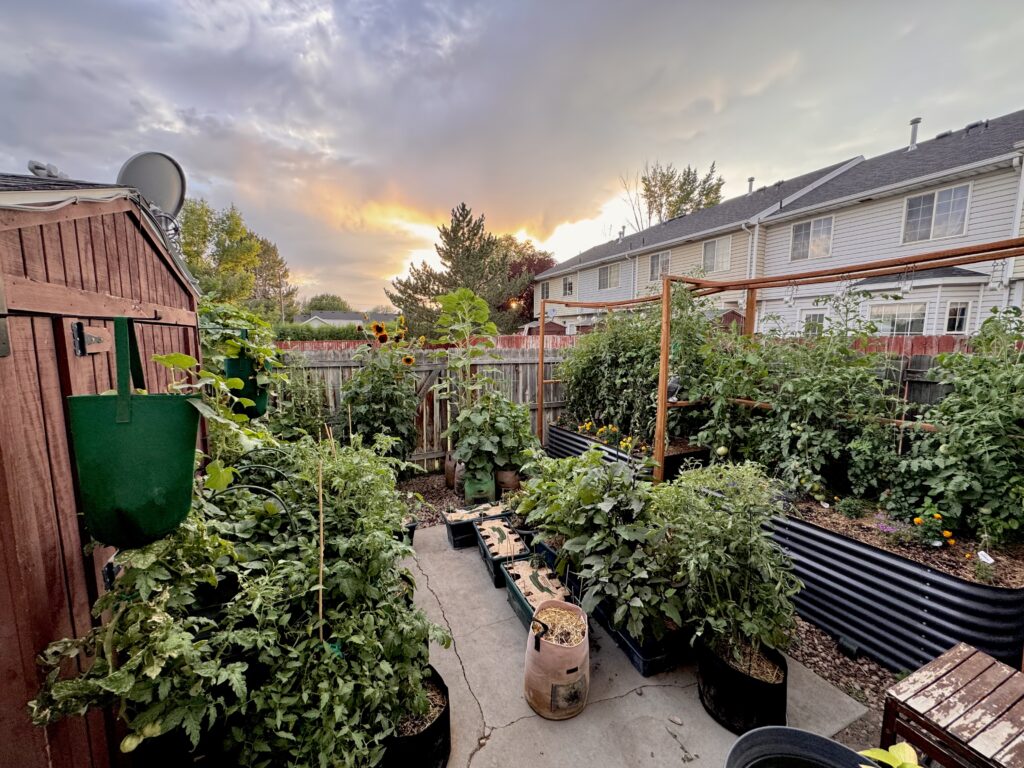
Amending your soil means improving its quality by adding organic matter, nutrients, or other materials to enhance its structure, drainage, and fertility.
This process helps create the ideal conditions for plant growth by balancing pH levels, increasing moisture retention, and replenishing essential nutrients that may have been depleted over time.
From my experience, amending your soil before the gardening season isn’t just worth the effort – it’s essential.
Without amendments, a dense vegetable garden won’t thrive long-term, as the soil would gradually deplete each year. High-yielding vegetable plants cannot naturally sustain themselves when grown at maximum density. This is especially important if you have a small gardening space like I do.
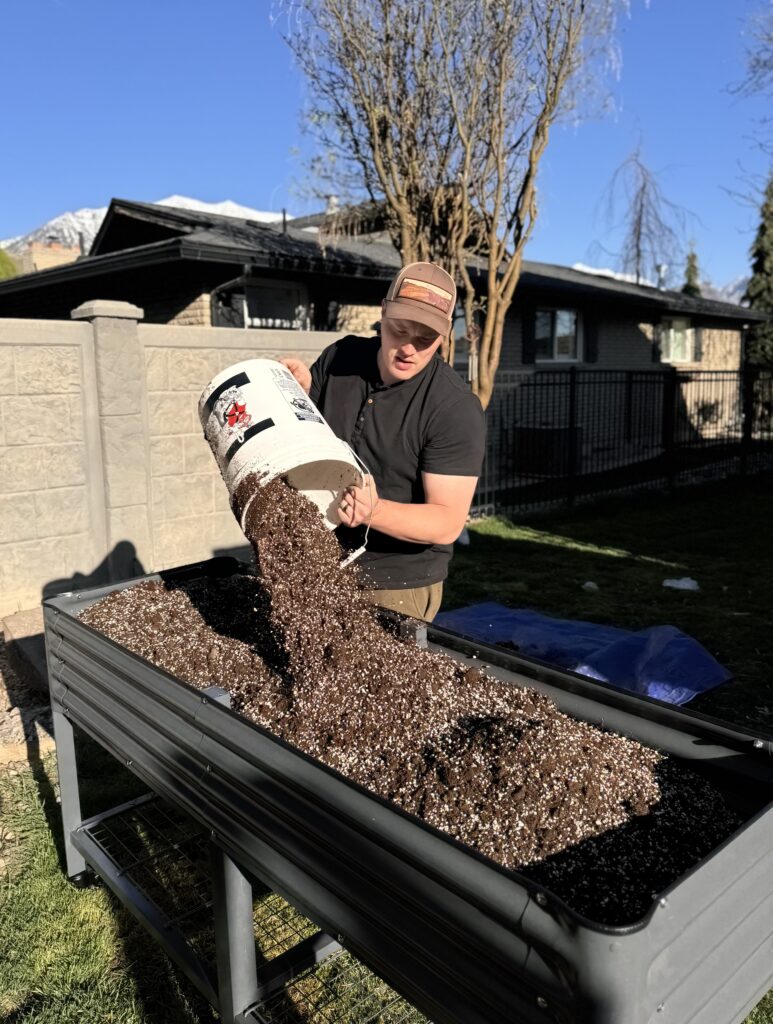
My goal when amending my soil is to create nutrient-dense soil with a healthy microbiome that can support high yields indefinitely. I also want to prioritize amendments that will ultimately yield more vegetables and not just bigger plants.
In this blog post, I’ll share the key soil amendments I use. While it might seem like a lot, most are applied just once per gardening season before planting, taking ~15 minutes per garden bed. A couple amendments are added throughout the season, and I’ll note those as I share them below.
Let’s get started!
What is NPK Ratio Summary and Why is it Important?
Most garden fertilizers display what’s called an “NPK ratio” on the packaging.
NPK refers to the proportion of Nitrogen, Phosphorus, and Potassium in the mix. These are usually spelled out because they are three of the main nutrients that plants need to thrive.
It’s useful to understand what each nutrient provides for plants so that you know why you would want to add a particular soil amendment:
- Nitrogen (N): Promotes leaf growth
- Phosphorus (P): Promotes root growth
- Potassium (K): Promotes healthy cells and strong plants
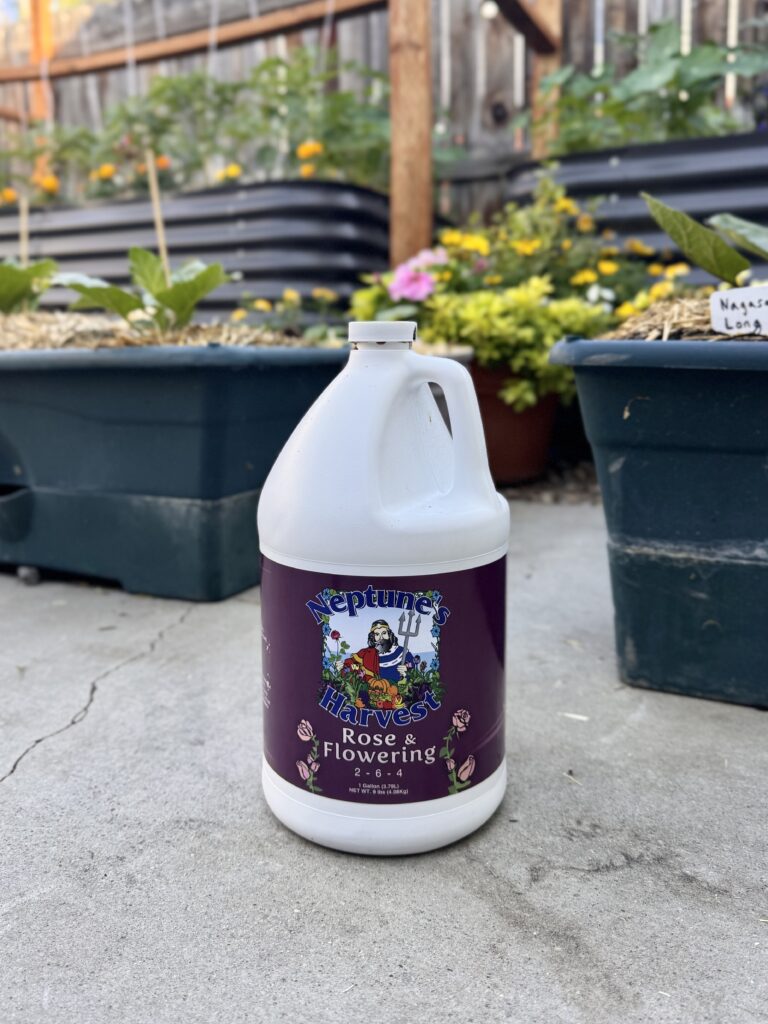
2 = Nitrogen (N) – Supports leafy growth and overall plant vigor.
6 = Phosphorus (P) – Encourages root development, flowering, and blooming.
4 = Potassium (K) – Helps with plant strength, disease resistance, and flower quality.
My #1 Soil Amendment: Espoma’s Organic Tomato-Tone
This isn’t sponsored! If I had to pick only one soil amendment, I’d pick Espoma’s Organic Tomato-Tone. Despite its name, this amendment isn’t just great for tomato plants – it also benefits a variety of other vegetables.
The mix includes manure, bone meal, and minerals for essential nutrients. Espoma also has other organic fertilizers, but they’re very similar.
I prefer using organic fertilizers to avoid risk of burning my plants. And yes, regular fertilizers can potentially burn your plants if improperly used! High-nitrogen fertilizers are especially prone to causing burns if applied too heavily or without proper dilution.
Synthetic fertilizers aren’t inherently bad, but overuse can harm your plants.. Espoma’s Organic Tomato-Tone is slow-release. This means it provides a steady supply of nutrients over an extended period of time.

Bone Meal
I add Bone Meal to my soil for its Phosphorus, helping my plants develop strong roots. Remember that too much Nitrogen can lead to large plants with little fruit, while Phosphorus encourages root development and flowering, resulting in a greater yield!
Bone Meal is a finely ground powder made from animal bones, typically livestock. It’s a rich source of Phosphorus and Calcium, two essential nutrients for plants.
A few other pros of Bone Meal:
- Enhances fruiting: Plants like tomatoes, peppers, and flowering plants benefit from Phosphorus, which supports more abundant fruits.
- Improves soil structure: The Calcium in bone meal helps balance soil pH, preventing it from becoming too acidic. It also strengthens plant cell walls.
- Slow-release nutrient: Bone Meal is a slow-release fertilizer, providing nutrients over time, which reduces the need for frequent applications.

Worm Castings
Worm Castings are the nutrient-rich excrement of earthworms. You can buy it for pretty cheap at garden stores! Worms break down organic matter, processing it into nutrient-rich castings filled with beneficial microorganisms. These castings are often called “black gold” by gardeners due to their rich, beneficial properties.
Benefits of Worm Castings:
- Natural pH Balancer: Help stabilize soil pH, making it more conducive for plant growth.
- Improves Soil Structure: Makes soil looser and more aerated. Helps roots access air, water, and nutrients more easily.
- Stimulates Plant Growth: Promotes faster growth, healthier leaves, and more vibrant flowers and fruits.
- Provides Nutrients: Contain a wide range of nutrients including Nitrogen, Phosphorus, Potassium, Calcium, and Magnesium.
- Suppress Harmful Pathogens: Reduces the need for chemical pesticides.
- Improves Water Retention: Improves soil’s ability to retain moisture-. This reduces the need for frequent watering (while also preventing overwatering).
- Increases Root Development: Supports plant growth and increases resistance to stress, disease, and pests.
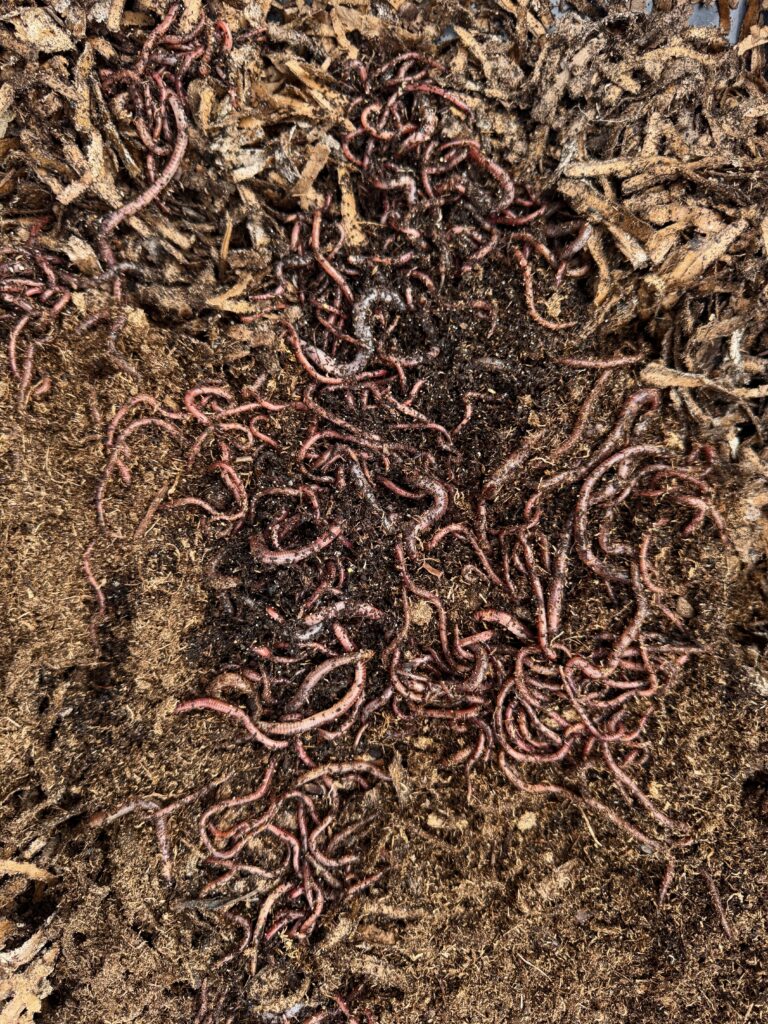
Dolomite
Dolomite is more of a nice-to-have–whether it’s truly necessary depends on your soil’s acidity. Dolomite is a type of limestone that contains both Calcium Carbonate and Magnesium Carbonate. Why is it used?:
- Improves Soil pH: Dolomite is commonly used to raise soil pH (make it less acidic). Tomatoes prefer slightly acidic to neutral soil (pH of 6 to 7). If your soil is too acidic, dolomite can help balance it out.
- Provides Magnesium: A central part of photosynthesis. Produces energy for healthy growth, strong stems, and vibrant leaves.
- Provides Calcium: Crucial for cell wall development! It prevents problems like blossom end rot, a common issue in tomatoes where the bottom of the fruit turns black due to calcium deficiency.
- Enhances Nutrient Availability: Increases availability of other nutrients in the soil.
Dolomite is particularly useful when the soil is Magnesium-deficient or where the pH is too low. Test your soil before applying Dolomite! Excessive use can make soil too alkaline.

Perlite
Perlite (pictured; right-hand) is a naturally occurring volcanic glass that, when heated, expands into small, lightweight, white, porous particles that look like styrofoam. Although not necessary from a nutrient perspective, it has many benefits. So what are its benefits?:
- Improves Drainage: Prevents soil from becoming too compact. It creates air pockets, allowing excess water to drain.
- Enhances Aeration: Its lightweight, porous nature ensures that plant roots have enough oxygen.
- Prevents Soil Compaction: Prevents the soil from becoming too dense and compacted, which can limit root growth and water movement.
- Improves Root Development: By improving aeration and drainage, Perlite encourages better root growth, and thus stronger plants
- pH Neutral: Perlite is pH-neutral, meaning it doesn’t alter soil’s acidity or alkalinity.

Vermiculite
Vermiculite is a naturally occurring mineral that expands when heated, creating lightweight, porous, and absorbent particles. It’s similar to Perlite in that you wouldn’t add it to your soil to give more nutrients, but rather to achieve a certain soil consistency. However, unlike Perlite which increases drainage, Vermiculite increases water retention. Still they have some similarities. Here are some of its benefits:
- Increases Root Development: By providing a more balanced environment with good moisture retention and air circulation, Vermiculite encourages strong, healthy root growth. Healthy roots are critical for absorbing water and nutrients efficiently.
- Improves Water Retention: Vermiculite has excellent water-holding capacity. It can absorb several times its weight in water, which helps maintain moisture levels in the soil, reducing the frequency of watering, especially in dry conditions.
- Enhances Aeration: While Vermiculite holds water, it also helps to maintain air pockets within the soil, ensuring that plant roots get adequate oxygen.
- pH Neutral to Slightly Acidic: Vermiculite generally has a neutral to slightly acidic pH, making it suitable for a wide range of plants without significantly altering the soil’s pH balance.
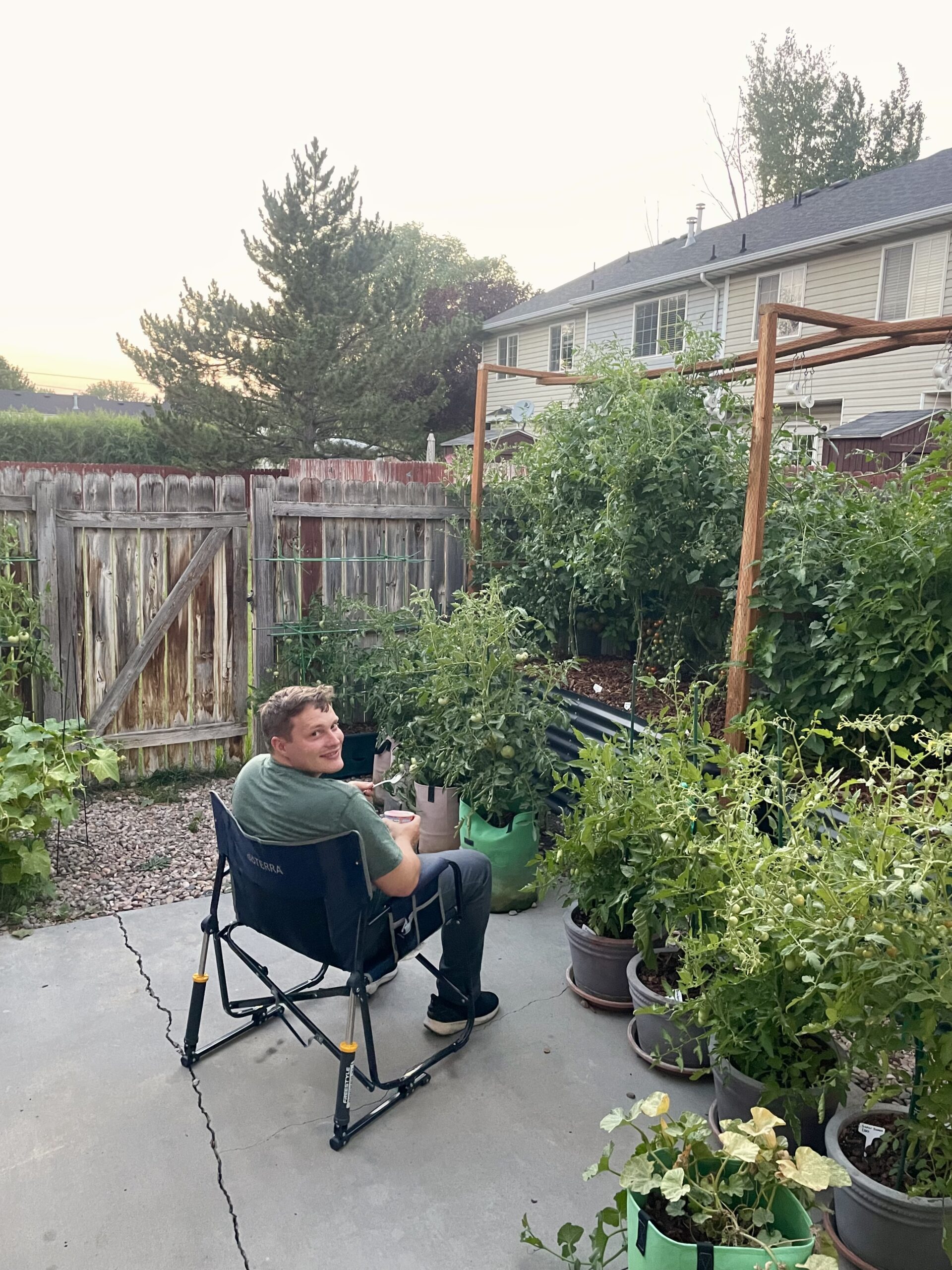
While I believe that amending your soil is necessary, you do not have to add every single one of these things.
A good all-purpose organic fertilizer is a great, low-risk soil amendment that should be sufficient. However, if you want to fortify your soil even more and have a bountiful harvest, you can add additional amendments that serve additional nutritional or textural functions.
Best of luck this gardening season!
If you enjoyed this, check out my other gardening blog posts:




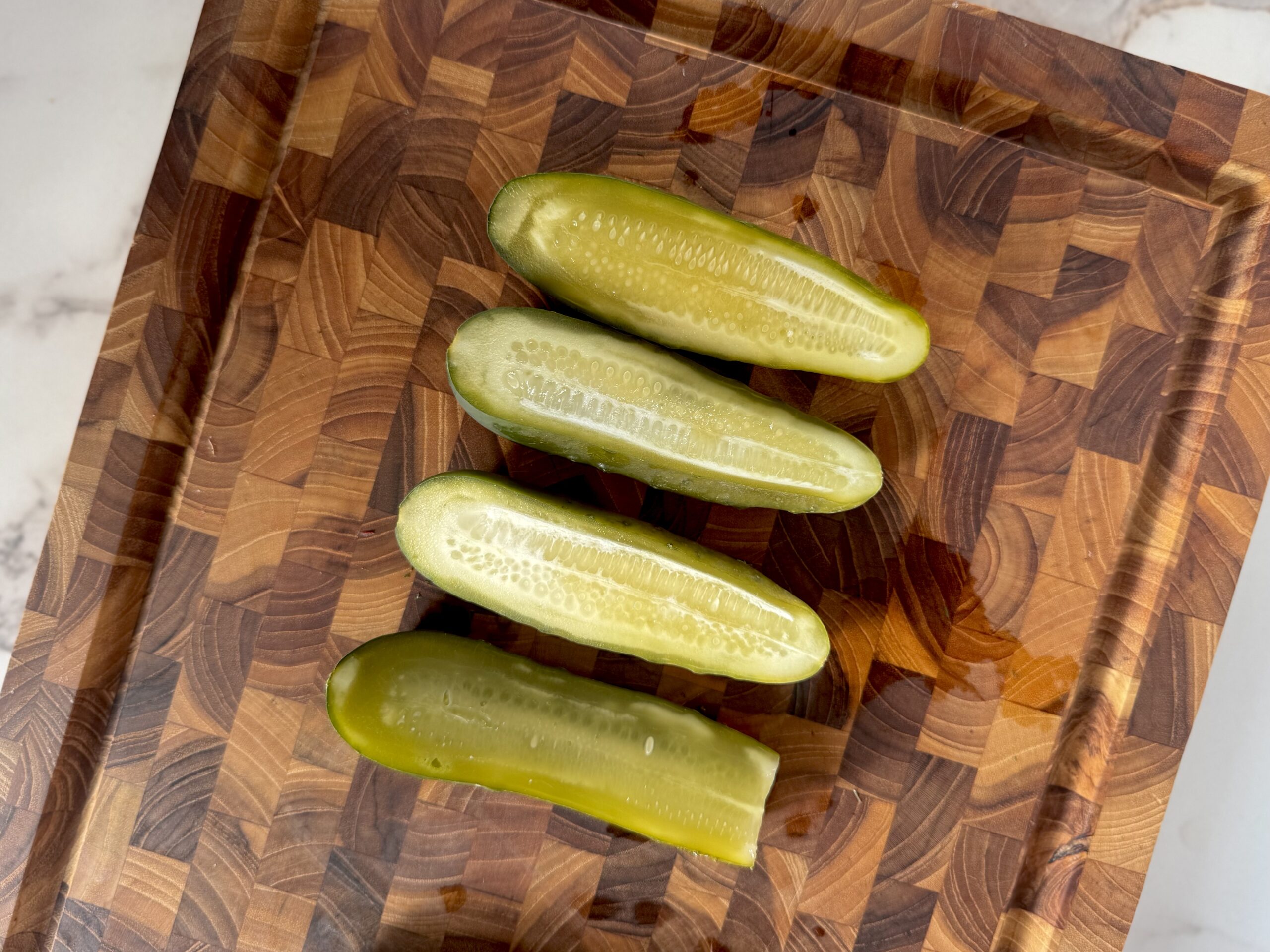
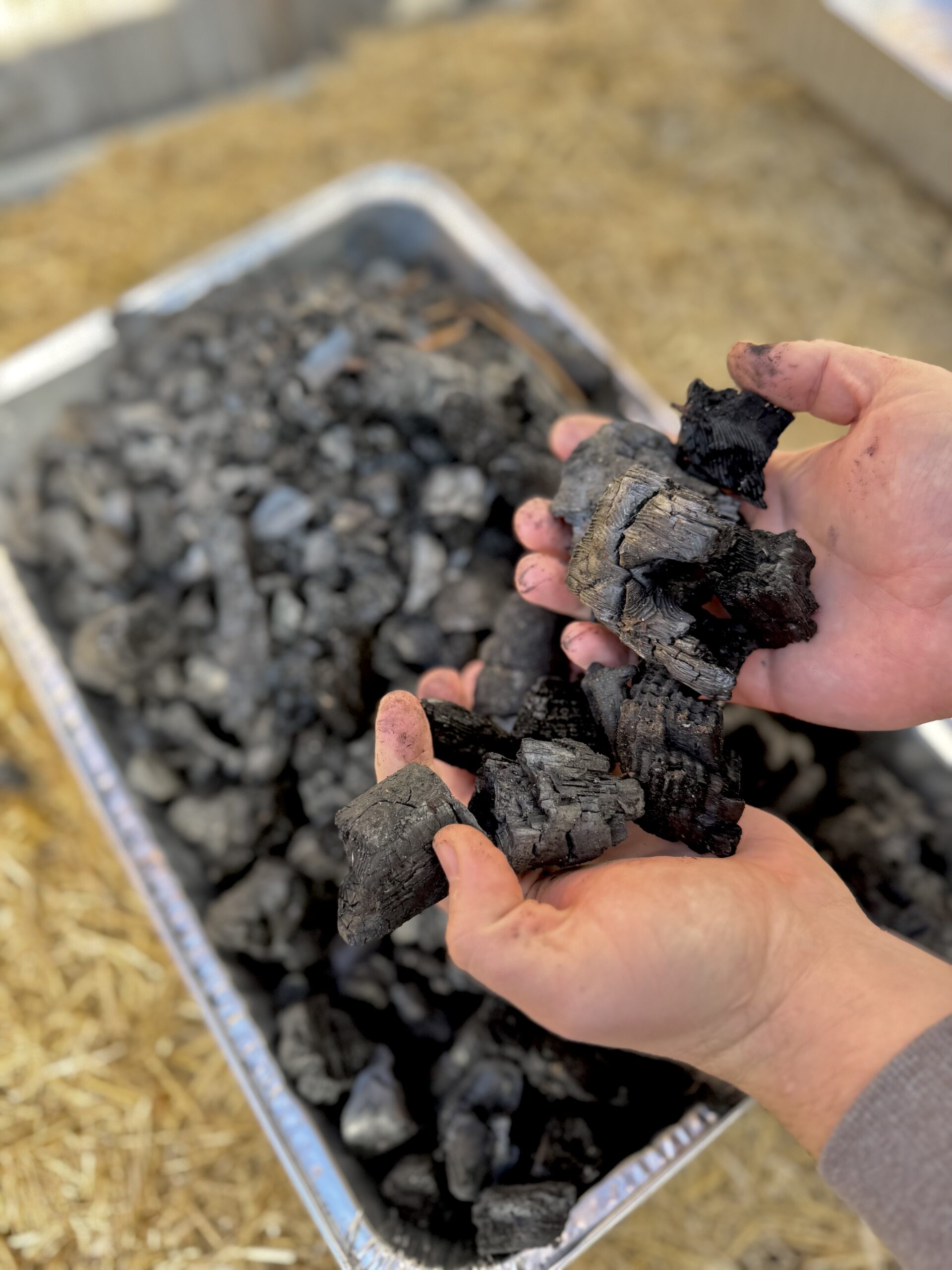

When do you recommend these amendments be done? Is February too late? I added manure to the bed in the fall.
Sorry Beth! We missed your question. February is not too late at all. Organic amendments can take months to fully break down in the soil so we like to do it at least a month before I plan on planting
I also love Espoma garden tone! It has worked so well for me.